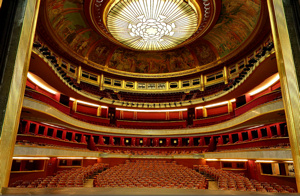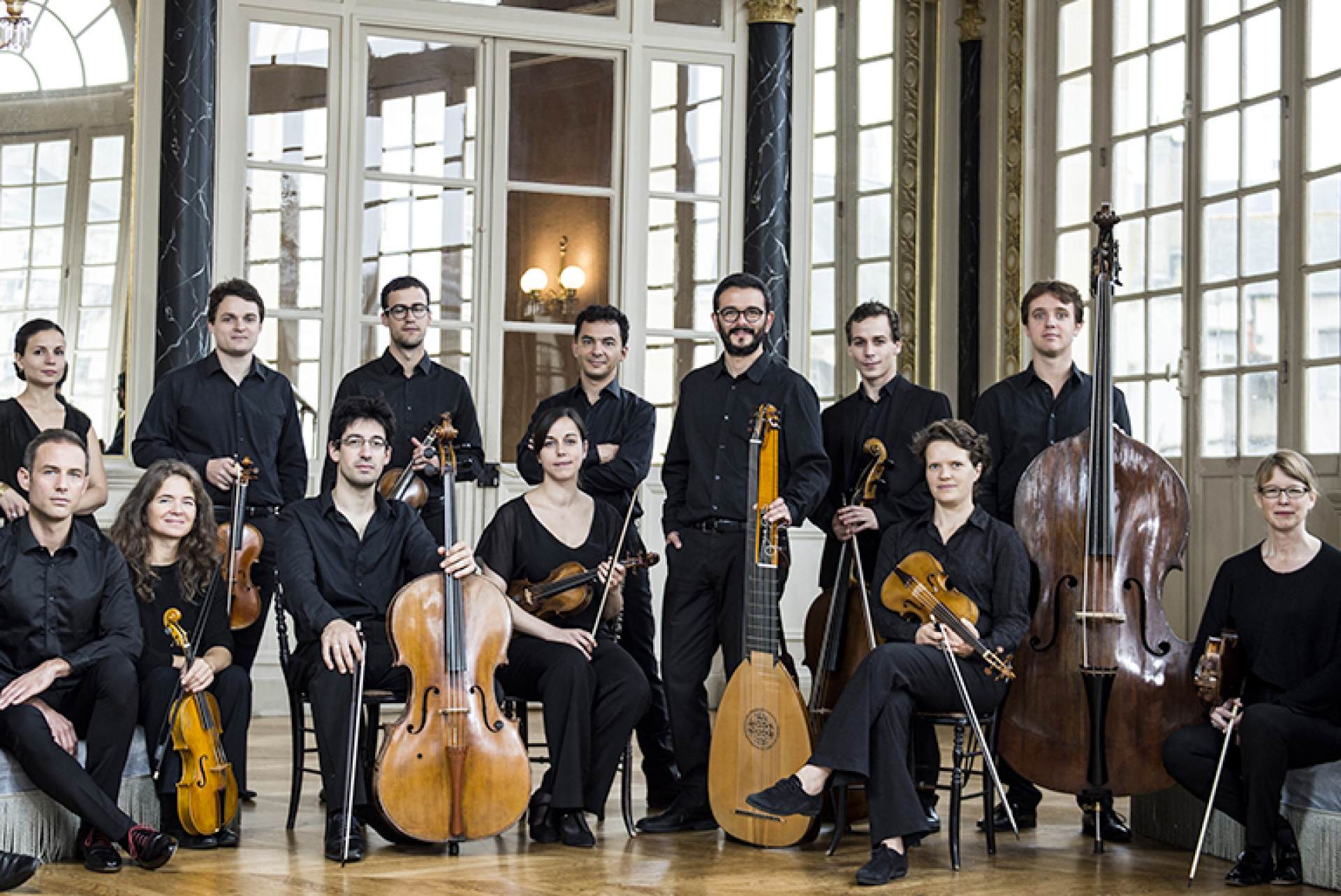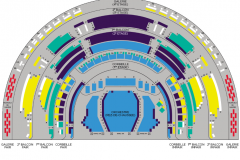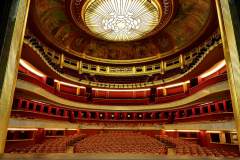The Coronation of Poppaea
December 2024 | ||||||
|---|---|---|---|---|---|---|
Mo | Tu | We | Th | Fr | Sa | Su |
Synopsis
The action takes place in Imperial Rome around AD 60, in and around Poppea's villa and in various locations within the imperial palace.
Prologue
The goddesses of Fortune and Virtue dispute which of them has the most power over humankind. They are interrupted by the god of Love, who claims greater power than either: "I tell the virtues what to do, I govern the fortunes of men." When they have heard his story, he says, they will admit his superior powers.
Act 1
Ottone arrives at Poppea's villa, intent on pursuing his love. Seeing the house guarded by the Emperor Nerone's soldiers he realises he has been supplanted, and his love song turns to a lament: "Ah, ah, perfidious Poppea!" He leaves, and the waiting soldiers gossip about their master's amorous affairs, his neglect of matters of state and his treatment of the Empress Ottavia. Nerone and Poppea enter and exchange words of love before Nerone departs. Poppea is warned by her nurse, Arnalta, to be careful of the empress's wrath and to distrust Nerone's apparent love for her, but Poppea is confident: "I fear no setback at all."
The scene switches to the palace, where Ottavia bemoans her lot; "Despised queen, wretched consort of the emperor!" Her nurse suggests she take a lover of her own, advice which Ottavia angrily rejects. Seneca, Nerone's former tutor, addresses the empress with flattering words, and is mocked by Ottavia's page, Valleto, who threatens to set fire to the old man's beard. Left alone, Seneca receives a warning from the goddess Pallade that his life is in danger. Nerone enters and confides that he intends to displace Ottavia and marry Poppea. Seneca demurs; such a move would be divisive and unpopular. "I care nothing for the senate and the people", replies Nerone, and when the sage persists he is furiously dismissed. Poppea joins Nerone, and tells him that Seneca claims to be the power behind the imperial throne. This so angers Nerone that he instructs his guards to order Seneca to commit suicide.
After Nerone leaves, Ottone steps forward and after failing to persuade Poppea to reinstate him in her affections, privately resolves to kill her. He is then comforted by a noblewoman, Drusilla; realising that he can never regain Poppea he offers to marry Drusilla, who joyfully accepts him. But Ottone admits to himself: "Drusilla is on my lips, Poppea is in my heart."
Act 2
In his garden, Seneca learns from the god Mercurio that he is soon to die. The order duly arrives from Nerone, and Seneca instructs his friends to prepare a suicide bath. His followers try to persuade him to remain alive, but he rejects their pleading. "The warm current of my guiltless blood shall carpet with royal purple my road to death." At the palace Ottavia's page flirts with a lady-in-waiting, while Nerone and the poet Lucano celebrate the death of Seneca in a drunken, cavorting song contest, and compose love songs in honour of Poppea. Elsewhere in the palace, Ottone, in a long soliloquy, ponders how he could have thought to kill Poppea with whom he remains hopelessly in love. He is interrupted by a summons from Ottavia, who to his dismay orders him to kill Poppea. Threatening to denounce him to Nerone unless he complies, she suggests that he disguise himself as a woman to commit the deed. Ottone agrees to do as she bids, privately calling on the gods to relieve him of his life. He then persuades Drusilla to lend him her clothes.
In the garden of Poppea's villa, Arnalta sings her mistress to sleep while the god of Love looks on. Ottone, now disguised as Drusilla, enters the garden and raises his sword to kill Poppea. Before he can do so, Love strikes the sword from his hand, and he runs away. His fleeing figure is seen by Arnalta and the now awakened Poppea, who believe that he is Drusilla. They call on their servants to give chase, while Love sings triumphantly "I protected her!"
Act 3
Drusilla muses on the life of happiness before her, when Arnalta arrives with a lictor. Arnalta accuses Drusilla of being Poppea's assailant, and she is arrested. As Nerone enters, Arnalta denounces Drusilla, who protests her innocence. Threatened with torture unless she names her accomplices, Drusilla decides to protect Ottone by confessing her own guilt. Nerone commands her to suffer a painful death, at which point Ottone rushes in and reveals the truth: that he had acted alone, at the command of the Empress Ottavia, and that Drusilla was innocent of complicity. Nerone is impressed by Drusilla's fortitude, and in an act of clemency spares Ottone's life, ordering him banished. Drusilla chooses exile with him. Nerone now feels entitled to act against Ottavia and she is exiled, too. This leaves the way open for him to marry Poppea, who is overjoyed: "No delay, no obstacle can come between us now."
Ottavia bids a quiet farewell to Rome, while in the throne room of the palace the coronation ceremony for Poppea is prepared. The Consuls and Tribunes enter, and after a brief eulogy place the crown on Poppea's head. Watching over the proceedings is the god of Love with his mother, Venere, and a divine chorus. Nerone and Poppea sing a rapturous love duet ("I gaze at you, I possess you") as the opera ends.
Program and cast
Sung in Italian, with French subtitles
Running time approx. 2h45
Catherine Trottmann | Poppea
Ray Chenez | Nerone
Victoire Bunel | Ottavia / La Virtù
Paul-Antoine Bénos-Djian | Ottone
Adrien Mathonat | Seneca / Consulo
Paul Figuier | Arnalta / Nutrice / Famigliare
Maïlys de Villoutreys | Fortuna / Drusilla / Damigella
Camille Poul | Amore / Valetto
Sebastian Monti | Lucano / Soldato / Famigliare
Thibault Givaja | Liberto / Soldato
Yannis François | Littore / Famigliare / Mercurio
Le Banquet Céleste
Théâtre des Champs-Élysées

The Théâtre des Champs- Elysées is undoubtedly one of the finest venues in Paris . Built in 1913 , it has the distinction of having been designed by a group of artists architects Henry Van de Velde and Auguste Perret , the painter and sculptor Antoine Bourdelle , the painter Maurice Denis , and the crystal- René Lalique to do mention the main ones . He was the first Parisian theater to be built entirely of reinforced concrete.
Restoration of the Great Hall devoted to operatic performances , symphony concerts and dance was decided in 1985. Two years later , on 23 September 1987, the theater reopened its doors , completely renovated. Fifteen years after this important work it was decided to undertake a new renovation campaign , but to prevent the complete closure of the theater for an entire season , work is now carried by step during the summer . Then it is to replace aging equipment , to remedy wear certain parts of the theater and improve spectator comfort and artists during their visit . Thus in recent years, including the work involved the renovation of marble facade, replacing the carpet in the room with wooden floors , installation of a new fully decorated wooden concert to a significant improvement of acoustics, the orchestra pit and stage below .
The Théâtre des Champs- Elysées is now a modern working tool receiving each year nearly 300,000 spectators and a few thousands of artists and collaborators.
The Théâtre des Champs- Elysées , the jewel of French architecture of the twentieth century, was in 1953 one of the first buildings of contemporary architectural heritage to be classified as historic monuments . Since 1970 the Caisse des Dépôts owns the entire building 15 avenue Montaigne and principal patron of the theater.
For over a century, Théâtre des Champs-Elysées has been the place where the most celebrated artists have come to make their names in Paris. The world’s finest orchestras and world-class soloists have always been a fixture at the Theatre. Théâtre des Champs-Elysées presents more than 200 concerts each year and is renowned for its outstanding performances of all genres, from classical music concerts and staged opera to contemporary dance and jazz.
How to reach us:
Subway: Alma-Marceau (line 9), Franklin D.Roosevelt (line 1), Pont de l’Alma (RER line C)
Bus: n° 42, 63, 72, 80, 92
Taxi station: Place de l’Alma, corner of avenue George V
Car park: Alma George V. The entrance is in front of n° 19, avenue George V
Fixed rate depending on the length of the performance. Payment upon entering.

 EN
EN DE
DE IT
IT FR
FR ES
ES RU
RU JP
JP RO
RO
 Seating plan
Seating plan 

